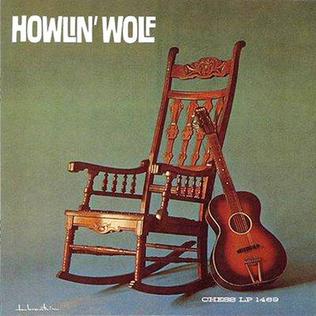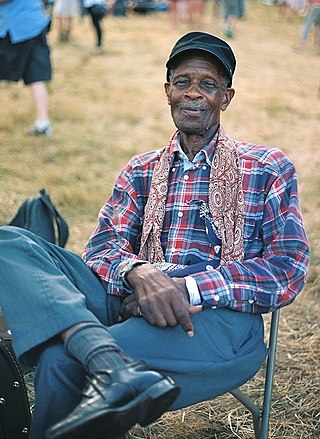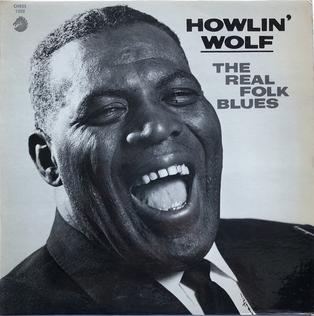
Chester Arthur Burnett, better known by his stage name Howlin' Wolf, was an American blues singer and guitarist. He was at the forefront of transforming acoustic Delta blues into electric Chicago blues, and over a four-decade career, recorded blues, rhythm and blues, rock and roll, and psychedelic rock. He is regarded as one of the most influential blues musicians of all time.
Electric blues is blues music distinguished by the use of electric amplification for musical instruments. The guitar was the first instrument to be popularly amplified and used by early pioneers T-Bone Walker in the late 1930s and John Lee Hooker and Muddy Waters in the 1940s. Their styles developed into West Coast blues, Detroit blues, and post-World War II Chicago blues, which differed from earlier, predominantly acoustic-style blues. By the early 1950s, Little Walter was a featured soloist on blues harmonica using a small hand-held microphone fed into a guitar amplifier. Although it took a little longer, the electric bass guitar gradually replaced the stand-up bass by the early 1960s. Electric organs and especially keyboards later became widely used in electric blues.

Luther Allison was an American blues singer-songwriter and guitarist. He was born in Widener, Arkansas, although some accounts suggest his actual place of birth was Mayflower, Arkansas. Allison was interested in music as a child and during the late 1940s he toured in a family gospel group called The Southern Travellers. He moved with his family to Chicago in 1951 and attended Farragut High School where he was classmates with Muddy Waters' son. He taught himself guitar and began listening to blues extensively. Three years later he dropped out of school and began hanging around outside blues nightclubs with the hopes of being invited to perform. Allison played with the bands of Howlin' Wolf and Freddie King, taking over King's band when King toured nationally. He worked with Jimmy Dawkins, Magic Sam and Otis Rush, and also backed James Cotton. Chicago Reader has called him "the Jimi Hendrix of blues guitar".
John Charles Brim was an American Chicago blues guitarist, songwriter, and singer. He wrote and recorded the song "Ice Cream Man" which was later covered by the rock band Van Halen for their first album, and by Martin Sexton on his 2001 album, Live Wide Open, and by David Lee Roth on his album Diamond Dave and by Swedish band FJK as "Isglasskis".

Howlin' Wolf is the second album from the Chicago blues singer/guitarist/harmonicist, Howlin' Wolf. It is a collection of twelve singles previously released by the Chess label from 1960 through 1962. Because of the illustration on its sleeve, the album is often called The Rockin' Chair Album, a nickname even added to the cover on some reissue pressings of the LP.

Haircut is the ninth studio album by American rock band George Thorogood and the Destroyers, released on July 27, 1993. The first single from the album was "Get a Haircut". The album peaked at No. 120 on the Billboard 200. The band supported the album with a North American tour.
Robert Lee "Smokey" Wilson was an American West Coast blues guitarist. He spent most of his career performing West Coast blues and juke joint blues in Los Angeles, California. He recorded a number of albums for record labels such as P-Vine Records, Bullseye Blues and Texmuse Records. His career got off to a late start, with international recognition eluding him until the 1990s.
Otis "Big Smokey" Smothers was a Chicago blues guitarist and singer. He was a member of Howlin' Wolf's backing band and worked with Muddy Waters, Jimmy Rogers, Bo Diddley, Ike Turner, J. T. Brown, Freddie King, Little Johnny Jones, Little Walter, and Willie Dixon. His younger brother, Abe, was the bluesman Little Smokey Smothers, with whom he is sometimes confused.
Little Smokey Smothers was a Chicago blues guitarist and singer. He played with the Paul Butterfield Blues Band and played with other Chicago blues musicians in the 1960s, then left music for most of the 1970s. He returned to music in the late 1970s and continued performing until his death in 2010.

Blues to the Bone is the twenty-seventh studio album by Etta James. The album contains a selection of twelve blues standards which are among her favourites. James and her sons Donto and Sametto James produced the album with Josh Sklair, which reached number four in the Billboard Top Blues chart.

His Best is a greatest hits album by American blues musician Howlin' Wolf. The album was originally released on April 8, 1997, by MCA/Chess Records, and was one of a series of releases by MCA for the 50th anniversary of Chess Records that year. Ten years later – on April 17, 2007 – the album was reissued by Geffen Records as The Definitive Collection.
Calvin "Fuzz" Jones was an American electric blues bassist and singer. He worked with many blues musicians, including Muddy Waters, Howlin' Wolf, the Legendary Blues Band, Mississippi Heat, James Cotton, Luther "Guitar Junior" Johnson, Little Walter and Elmore James.

"Moanin' at Midnight" is a blues song written and recorded by Howlin' Wolf in 1951. The recording was released on Chess Records as his debut single. It charted on Billboard's R&B chart, but the B-side, "How Many More Years," became the popular side of the record.
Richard L. Shurman is an American record producer, sound engineer, music journalist, music historian, and backing vocalist.

Lee Chester "L. C." Ulmer was an American delta blues musician. He was a regular performer for over half a century, playing at festivals and clubs throughout the United States and elsewhere, but particularly in the Deep South. Ulmer was featured in the 2008 documentary film M for Mississippi: A Road Trip Through the Birthplace of the Blues. His earliest musical influence was Blind Roosevelt Graves. Ulmer later met numerous notable musicians, including Elvis Presley, Les Paul and Mary Ford, Brook Benton, Nat King Cole, Fats Domino, Louis Armstrong, Muddy Waters, Elmore James, Howlin' Wolf, and Buddy Guy, and performed with some of them.
Earring George Mayweather was an American electric blues and Chicago blues harmonica player, songwriter and singer. He recorded only one solo album, but he played the harmonica on recordings by J. B. Hutto and Eddie Taylor.

Howling Wolf Sings the Blues is a compilation album by blues musician Howlin' Wolf, which was released by Crown Records in 1962. The original album included eight songs recorded for Modern Records between 1951 and 1952, including those tracks that were released as singles by the RPM, and an additional two instrumentals by Joe Hill Louis. The album was re-released in 1970 by United Records with the alternative title Big City Blues.

The Real Folk Blues is a compilation album by blues musician Howlin' Wolf, which was released by Chess Records in 1965. The album's songs, which were originally issued as singles, were recorded in Chicago between 1956 and 1965.

The Real Deal is an album by the American musician Smokey Wilson, released in 1995. Wilson supported the album with a North American tour.











